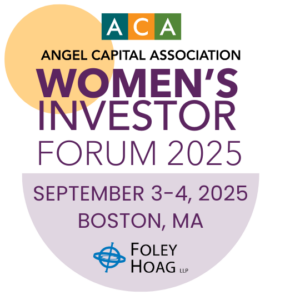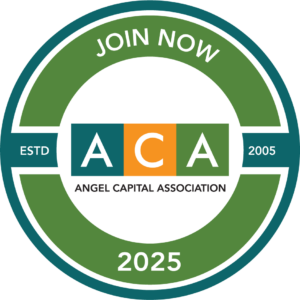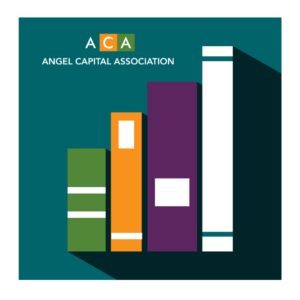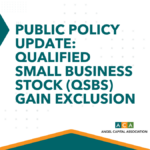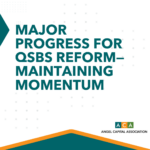
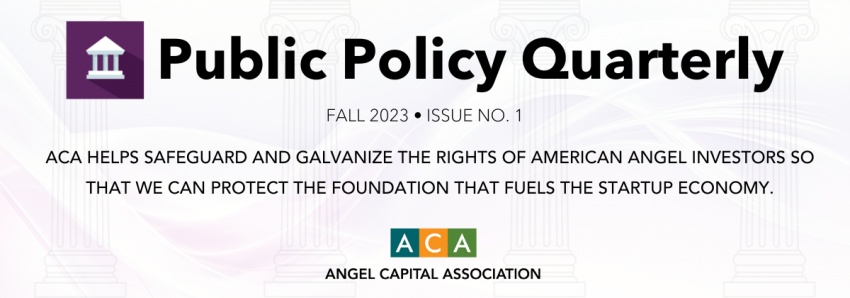

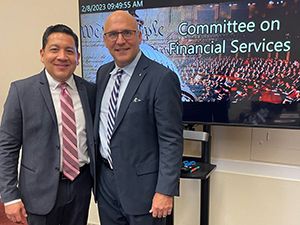
In this Issue:
How the ACA Public Policy Committee Engages for the Benefit of All Angel Investors and the Entrepreneurial Ecosystem
This past quarter has been a busy one for the ACA Public Policy team and has been incredibly active in 2023.
ACA has continued its efforts to push legislation to help the entire Angel community. Through ACA’s strong and experienced public policy leadership team,
ACA has been able to gain more diverse voices as both investors and entrepreneurs. ACA continues to foster good lines of communication with the SEC and good relationships at the SBA. With these key relationships, more and more key members of the House are seeing ACA as a valuable resource. Now that ACA has built up a positive global reputation, it is looking to be more active at the grassroots level while expanding the public policy committee.
The History of the ACA's Public Policy Efforts
The Angel Capital Association was a nascent organization in 2009-2010 when Congress developed the bipartisan Dodd-Frank Act in response to the fallout of the great recession. During negotiations on Dodd-Frank, Congress considered changes to the definition of “accredited investor,” including the elimination of the value of a primary home from inclusion in an individual’s net worth. House and Senate staff turned to ACA to understand the impact of changing the definition on the angel community. ACA and its members recognized the need for a strong advocacy arm and public policy agenda to educate Members of Congress on issues that affect angel investors and early-stage entrepreneurs.
In 2011, under the leadership of Public Policy Chairman Dan Rosen (Seattle, Washington), ACA decided to engage Washington, DC counsel to navigate public policy on Capitol Hill, the executive branch and the Securities and Exchange Commission. ACA retained the global public affairs firm of APCO Worldwide, with ACA’s engagement led by current ACA lobbyist Chris McCannell, who had been an aide to former Senate Banking Committee Chairman Don Riegle (D-MI).
The ACA lobby team began by building out a public policy agenda and identifying a legislative committee and grassroots activists. ACA also became part of the innovation ecosystem in Washington, DC, partnering with other organizations and joining White House and other Obama administration initiatives to shine a light on entrepreneurship. This early work manifested itself in ACA’s role as one of the key supporters of the JOBS Act to expand opportunities for early-stage investing, create crowdfunding in the United States, and promote entrepreneurship.
In 2014, then-House Ways and Means Chairman Dave Camp (R-MI) began to pursue updates to the tax code that would streamline the code and better reflect the majority’s priorities. ACA representatives testified at hearings on those proposals and were active advocates for maintaining special incentives for early-stage investments.
When APCO pivoted away from government relations work in 2015, Chris McCannell joined leading Republican lobbyist Doyle Bartlett, former House Financial Services Republican staffer Greg Mesack and the team at what was then The Eris Group. Chris and his bipartisan team advocated successfully for full 100% deductibility of capital gains taxes on early stage start-up investing (Section 1202), which became law in late 2015 as part of the Protecting Americans from Tax Hikes Act (PATH Act).
Working with the Eris (now GrayRobinson) team, ACA worked to protect early stage tax-treatment in 2017’s Tax Cut and Jobs Act (TCJA). ACA has also lobbied on Capitol Hill and with the SEC to maintain the current definition of an accredited investor. ACA won legislation to expand the number of eligible investors in an early-stage fund from 99 to 250 and legislation to ensure that traditional demo days are not recognized as crowdfunding events. As part of these efforts, ACA representatives testified in both the United States House of Representatives and the Senate; ACA members have served on key committees at the SEC; and ACA has engaged with the United States Small Business Administration, the United States Department of Commerce and the Office of National Economic Policy.
ACA’s approach to public policy has evolved from a reactive stance to a proactive one. Through the work of its public policy team and committed members, ACA has become a leading voice on Capitol Hill for the early stage investing community, promoting a stronger entrepreneurial ecosystem.
Public Policy Committee Leadership
Our work is done through a dedicated committee of more than 40 volunteers who believe in championing and protecting the angel investing space. We are led by:
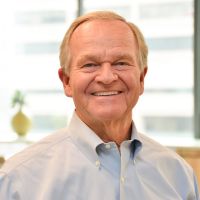
Clay Rankin
Public Policy Committee Chair

Pat Gouhin
CEO, Angel Capital Association

Chris McCannell
Government Relations Consultant

Blair Hancock
Government Relations Consultant

Joe Wallin
Legal Advisory Council Chair

Left to right: Ammon Simon, Counsel to Commissioner Peirce, Krista Covey, President, First Flight Venture Center, Elaine Bolle, RTP Capital, US Securities and Exchange Commissioner HesterPeirce, Marcia Darwood, Chair, ACA Board of Directors, Mary Musacchia, RTP Capital and First Flight Venture Center, Mark Friedman, RTP Capital Associates, Eva Doss, President and CEO, The Launch Place and Pat Gouhin, ACA CEO.
What We’ve Done So Far This Year
2023 has been extremely busy for ACA. The busy year started off when leadership met with SEC Commissioner Hester Peirce to discuss the accredited investor definition, QSBS and how to build a more successful startup ecosystem. In January, ACA also sent an important letter to the Office of Patent Legal Administration asking for reliability and flexibility in the patent system. This letter emphasized how important patents are to startup companies.
In February, ACA took its work to the hill when ACA Board Member Eli Velasquez and ACA Member David Olivencia testified before Congress as part of the Subcommittee on Capital Markets hearing on how the accredited investor definition unfairly limits investment access for the non-wealthy.
ACA CEO Pat Gouhin traveled to DC in April alongside North Coast Ventures Founder and ACA member Clay Rankin to continue discussions about the accredited investor definition and QSBS. ACA leadership met with directors from the SBA, members of the Ways and Means Committee, policy directors at the SEC and several members of Congress. These substantive talks focused on reforms to improve small businesses, the negative consequences of raising the threshold of the accredited investor definition and how to improve access to capital.
Collectively, the Coalition sent a formal letter to Congressman David Kustoff’s proposed changes to expand and protect the Accredited Investor definition.
Also in April, Congresswoman Ann Wagner from Missouri was a guest on ACA’s podcast “The Angel Next Door.” As the chair of the House Financial Services subcommittee on Capital Markets, she discussed her plans to pursue innovation and provide oversight of the SEC and CFPB. She has introduced bills focused on public markets, small businesses and retail investor opportunities. She also spoke on how she is working to reform the current accredited investor definition. This episode gave great insight into what Congress is doing to increase opportunities for small businesses and investors.
In May, ACA Board Chair Marcia Dawood was named to the Small Businesses Capital Formation Advisory Committee. This committee provides advice and recommendations to the Commissions on rules, regulations and policy matters relating to small businesses.
SEC Commisioner Hester Peirce joined The Angle Next Door for the episode, “Investments and Capital Markets from the Point of View of SEC Commissioner Hester Peirce” in May to discuss fraud, the misperception of failure in the private investment world, the accredited investor definition and diversity in capital markets. Congressman David Kustoff from Tennessee also joined The Angel Next Door podcast in May for “How Expanded Legislation Can Help Incentivize Small Business Investments with Congressman David Kustoff.” On this episode Congressman Kustoff talked about some of his constituents’ most pressing isues like inflation, supply chain and labor issues and the difficulty small businesses have with navigating rough regulations when raising capital. He introduced the Small Business Investment Act of 2023 to change the QSBS holding period for stock to make these investments more attractive to investors.
The ACA Public Policy Team was back in DC in July to meet with Congressional Leaders and members of the SBA and EDA. This visit’s main goal was to support expansion of Section 1202 exclusion of gain from the sale of qualified small business stock. They also urged legislators to protect financial thresholds in the current definition.
In September, we issued an article on the SEC’s adoption of new private fund adviser rules and the application to exempt reporting advisers by Mark Heine and Gary Kocher K&L Gates LLP.
Public Policy Priorities
The main policy focus for the near future is to resist changes to financial thresholds at the SEC and to push for financial sophistication measures, including legislation and regulation. These two actions will help to solidify the accredited investor definition. This helps angel investors trade securities without registering with financial authorities. In addition, the push for more financial sophistication measures includes getting an Angel University accreditation and increasing the amount of content available. ACA is also working with FINRA and NASDAQ to gauge interest in engaging with ACA on testing requirements. ACA continues to follow the SBA’s lead in recruiting more diverse investors and founders. The SBA is a great example for ACA to follow in how they have sustainable companies with diverse founders. This will also allow ACA to continue differentiating stakeholders to better represent underserved communities.
Another main policy priority is to push for QSBS-Sec. 1202 to be included in the final tax legislation. The Qualified Small Business Stock gain exclusion and Section 1202 encourages investments in small businesses. This preserves the current tax treatment and emphasizes the positive impact entrepreneurs have on the small business economy. This creates massive benefits to selling shareholders. There are many eligibility requirements to receive this tax benefit, but once qualified, these savings can be very helpful for both large and small businesses. Another bill ACA is pushing is Congressman William Timmons’s bill, the Improving Capital Allocation for Newcomers Act. This bill modifies the Qualifying Venture Capital Fund Exemption under the Investment Company Act of 1940 by increasing the cap from $10 million to $150 million and increased the allowable number of investors from 250 to 600. ACA is working with Congressman Timmons and Congresswoman Ann Wagner to ensure angel investors understand and utilize this bill. ACA is also lobbying in support of the Helping Angels Lead Our Startups (HALOS) Act of 2023. This act allows angel invests to present at demo days without making a specific investment solicitation and will help companies engage with a wider audience of investors. It will help develop a better, more diverse economy. This bill is sponsored by Congressman Mike Lawler.
In addition to policy priorities, ACA is focused on creating a better committee structure, developing regular communication with ACA membership, developing more support data and broadening coalition support for additional issues. In terms of leadership structure, ACA plans on adding three public policy positions on the Leadership committee. This will help in the efforts to reenergize the grassroots efforts. After the November 2024 elections, ACA will ramp up its communications and messaging and engage with a legal advisory council to draft legislative language for the re-proposed Section 1202. This fall, ACA will continue to follow up with Republicans and moderate Democrats in Congress. All of this will help ACA broaden the coalition of support.
ACA’s public policy priorities are vast, but with the help of the many members, ACA sees these goals as achievable and sustainable.
The ACA Coalition Partners
The ACA have formed a coalition with partners, key stakeholders in the entrepreneurial ecosystem. The organizations that make up the coalition all care about legislative and regulatory issues that impact either investors or entrepreneurs in early-stage startups. Through the coalition, we amplify any of our individual voices on the common ground issues that we all share. By having this coalition, it allows us to identify leads on different issues that affect everyone – a prime example being the defense of the accredited investor definition. While ACA has led the effort, we’re supported by and engaged with our partners.
The Coalition:
What's Next: ACA Public Policy and the Grassroots Effort
The strength of the ACA is the strength of its members. One area where we seek to leverage this strength is making sure that lawmakers understand how critical angel investors are in stimulating the entrepreneurial economy throughout the country. Unfortunately, this is not always well understood and many misperceptions exist.
To help ensure rules and/or legislation that directly affects entrepreneurs and investors (think accredited investor rules, Section 1202 Qualified Small Business Stock, etc.) are crafted so all implications are considered, we want to make sure angel investors stay current on proposals that may be considered or released that could impact their members and portfolio companies.
This is both proactive (making sure that legislators understand the impact angel investing has) and reactive (if a proposal comes out that may have consequences not fully considered, to make sure legislators are made aware of the potential unintended impact). This grass roots effort will include localized communications that the ACA will help craft to illustrate the importance that angel investors have in the entrepreneurial ecosystem. Stay tuned for more information as this continues to develop. In particular if there are any adverse rulings drafted (such as what’s being contemplated for accredited investor changes), we stand ready to spring into action. Even in 2023, grass roots efforts have tremendous impact.
If you’re interested in volunteering or joining the ACA Public Policy Committee Ambassador program, please reach out here!

